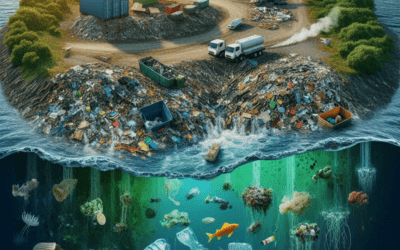The Second Recycling Revolution – Part 4
By Guest Authors Neil Seldman, The Recycling Cornucopia Project, Zero Waste USA and
Susan Kinsella, Conservatree and The Recycling Archives
New technology offers cities and counties the option to localize recycling through mini-MRFs operating at 50-150 tons per day. These facilities fit into small and urban communities and yield high quality clean materials that earn premium prices in the marketplace.
An older technology is also holding its own within the U.S. panoply of approaches to recycling. Curb sort, where workers separate curb-set materials into a compartmented truck, has been serving rural (Centre County, PA) and urban (Fayetteville, AR) jurisdictions for many years and remains popular. The cost of additional labor en route is more than made up from savings on costs for processing. The curb sort collection is the first step in efficient processing that yields high value materials. Curb sort provides the best education tactic for households, since non-recyclable materials are returned immediately.
Mini MRFs allow for in-town processing, clean materials, and direct access to end users through Cooperative Marketing organizations that avoid needless intermediaries, long distance transportation of low value materials and double handling of collected materials.
Extended Producer Responsibility Legislation Raises Concerns
The Extended Producer Responsibility (EPR) debates have been a welcome breath of fresh air, forcing us to address the key question: Who makes decisions about recycling? Big Soda and Big Packaging, with support from non-profit organizations such as the Product Stewardship Institute (PSI), the National Stewardship Action Council (NSAC), want a monopoly on policy decisions that will have the ‘force of law’. [1]
Confusion about EPR rattled discussions and mistakenly drew attention away from the goal of reducing waste and stopping plastic pollution. In time, balance was restored in the public’s mind as it dawned on many people that giving control of recycling and plastic to companies in the plastic/oil/packaging industrial complex was counter-intuitive. Increasingly, people are asking, “Aren’t these the companies that caused the problems and lied to us about their impacts for generations? Why should the foxes be in charge of the hen house? Shouldn’t citizens decide on things that will impact their behavior?”
The goal of corporate-controlled EPR is to divert attention from the petroleum/plastics industry’s transition to a new profit center. Billions of dollars are already being planned for new virgin plastics production. Their control over recycling will mean more virgin plastics production, more incineration. EPR is thus purposefully complicated, involving paper and metal recycling despite their already being recycled at high rates. In this confusion, the petroleum/plastics industrial complex will continue to prosper. The environment will continue to degrade.
Recycling Is Infrastructure Too!
Campaign Promotes American Recycling Infrastructure Plan
The Recycling Is Infrastructure Too! Campaign (RIIT), coordinated by the National Recycling Coalition, Institute for Local Self-Reliance, and Zero Waste USA, has greatly helped the return of reason. Its advancement of the American Recycling Infrastructure Plan (ARIP)[2] is drawn from four discreet plans for accelerated recycling and Zero Waste and presents a $16 billion, ten-year plan comprised of diversified, locally approved policies and programs for the 21st century. Focused investment and “New Localism” are the keys, and examples of them succeeding include:
- Eureka Recycling in Twin Cities, Minnesota sells 90% of processed recyclables within the state.
- Reuse Minnesota has documented 55,000 jobs in the reuse sector.
- Austin, TX, after 10 years of investing in Zero Waste, has created 600 jobs and added over $1 billion in economic growth.
- A pending mandatory bill in the Baltimore City Council will double the number of jobs at Second Chance deconstruction company, which already employs 250 workers recruited from hard-to-employ residents of the city.
- Thriving reuse networks crisscross the country, including The ReUse Corridor in Central Appalachia (serving Ohio, West Virginia and Kentucky); Second Chance in Baltimore (covering the US East Coast, and west into Ohio); The Reuse People (coordinating a network of 16 for-profit and nonprofit enterprises); Saint Vincent de Paul (operating a network of repair and reuse workshops from Portland, OR to San Francisco, CA, as well as the Cascade Alliance, a nationwide network of nonprofit reuse enterprises); Habitat for Humanity’s ReStores throughout the country; The South East Recycling Development Council (southeast U.S.); and The Building Materials Reuse Association (the trade association for the deconstruction industry).
Guidelines for the future require careful attention to legislation, as well as focus on rulemaking after laws are passed to guarantee that the principles of decentralization, local recycling and, above all, citizens’ right to vote on decisions that affect them directly remain intact.
Can ARIP and the RIIT Campaign inform legislators, agency staff, industry and the public, as well as stem the tide of Big Waste, Big Packaging and Big Plastic, while assuring steady progress to a Zero Waste economy? Yes, it can, if Americans follow their hearts and their instincts to conserve value in our economy and society.
Here is what we need to do:
- TAX what you do not like or want – landfills, hybrid packaging, and plastic products.
- INVEST in what you do want – source reduction, distributed composting, resource recovery parks, local recycling and reuse for local and regional markets.
- BAN what is toxic and dangerous – single-use plastics, incinerators, polystyrene packaging.
- VOTE for elected officials who champion Zero Waste.
Gary Liss, influential thinker for the Sierra Club, National Recycling Coalition and Zero Waste USA, asks, “How much waste do we want?” The answer from Americans is loud and clear – ZERO for a fair, ample and safe future.
[1] See, https://ilsr.org/force-of-law-epr/. [2] Recycling Infrastructure Plan, Resource Recycling.com Building America's Zero Waste Future, ILSR, 2021 The article originally appeared in the National Recycling Coalition Newsletter December 2022. https://nrcrecycles.org/




